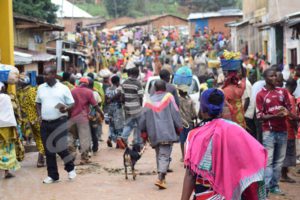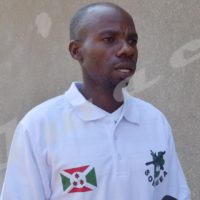The Minister of Health calls on all Burundians to significantly reduce the birth rate. She says the average population density is 400 inhabitants per square kilometer, which is a hindrance to development in a country where 90% of the population depend on agriculture and livestock.

The population of Kinama, in Mubimbi commune of Bujumbura province
On the occasion of the World Population Day celebrated on 11 July each year, Burundi Minister of Health, Josiane Nijimbere calls on all Burundians to hold down the birth rate. “The population has increased four times from the independence of Burundi in 1961 to 2017,” she said.
Overpopulation is a hindrance to development in a country where 90% of the population live mainly on agriculture and livestock, according to Minister Nijimbere. She says that the density is 400 persons per square kilometer in some areas of Burundi.
To address this issue, Burundi Government has implemented programs to reduce the birth rate in order to achieve the Government’s vision of decreasing birth rate to 20% by 2025, says Nijimbere.
She welcomes the fact that Burundi has taken an important step towards limiting birth rate. “Women who use contraception have moved from 2.7 per cent in 2005 to 42 per cent in 2017,” says Minister of Health.
Burundi’s surface area is 27,830 km2 with an average density of 354.3 inhabitants per square kilometer.
Over 75% of Burundi population are under 35
The chairman of the local NGO, PARCEM, Faustin Ndikumana, said that according to statistics provided by UNFPA, in 2030, Burundian population would be doubled and, consequently, food needs would double as the arable land would be halved.
He says he is concerned that 75% of the Burundian population are young (under 35) and that over a half of them have no jobs. “Over 50 per cent of young people living in rural areas and 60 per cent in urban areas are unemployed,” Ndikumana says.
He also says Burundi is one of the countries with the highest birth rate. “The birth rate in Burundi is six children per woman. Experts recommended that this birth rate be reduced to three children per woman, “he says.
According to Professor Evariste Ngayimpenda, an expert in demography, Burundi is undergoing a worrying demographic pressure. “Burundi is not poor because we are too many, but because we are not well organized,” said Ngayimpenda.
The expert says that if Burundians adopt family planning, the population will reach 15 million which will also remain catastrophic in the current economic context. “If we increase production, a 15 million population is not a problem in Burundi,” says the expert in demography.
He believes that the fact that 90% of the Burundian population depend on agriculture and livestock makes it difficult to have a good production since the Government does not provide enough training to the population on how they should increase their production.
He calls on the Burundian authorities to prepare and set up long term projects to train intellectuals who will help young Burundians learn from other countries’ experience.



















 IWACU Open Data
IWACU Open Data

